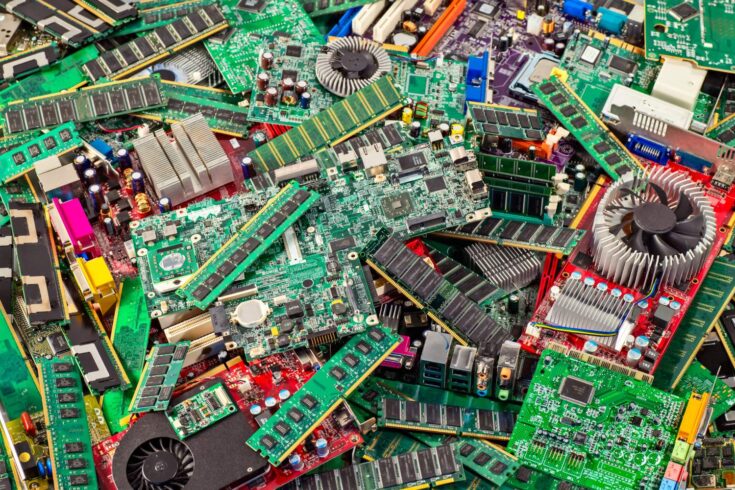The 18 UK biotechnology projects awarded funding by the Biotechnology and Biological Sciences Research Council (BBSRC) are either:
- working to make the textile industry more sustainable
- will support the recycling and reuse of technology-relevant metals
Reducing the environmental footprint
Currently textile manufacturing has an unsustainable environmental footprint, while large amounts of technology-relevant and valuable industrial metals are lost at the end of a product’s life due to inadequate recycling technology.
The new funding is designed in association with the BBSRC Networks in Industrial Biotechnology and Bioenergy (BBSRC NIBB). This will support the creation of a strategic research programme that inspires the UK biotechnology community to develop applications that tackle these challenges and promote sustainability.
To receive funding, projects had to demonstrate genuine innovation as well as:
- the effective reuse of resources
- reduced fossil fuel usage
- promoting the switch to bio-based alternatives
Bacterial cellulose
Among the 18 innovators awarded funding is Dr Meng Zhang of Northumbria University. Dr Zhang is researching new ways to use bacterial cellulose as a promising material for the replacement of a range of textiles.
Bacterial cellulose is a natural biomaterial with many advantages, not least its strength and biodegradability. This could play a major role in more sustainable textile manufacturing in the future.
Reducing industrial indigo dye pollution
Meanwhile, Professor Nigel Minton from the University of Nottingham is working on ways to replace synthetic blue dye.
This dye is a mainstay of textile manufacturing, particularly of denim, but it is made using fossil fuels and creates significant pollution.
Professor Minton and his team are pioneering a return to natural, plant-based processes to produce indigo by delivering a bacterium fine-tuned for industry use.
The team will use genome engineering tools to optimise the performance of the bacterium required in the fermentation of the dye.
Valuable metal bio-recovery
At the University of Edinburgh, Professor Louise Horsfall is researching new ways to recover valuable cobalt, nickel and manganese from used lithium-ion batteries through the biosynthesis of metallic nanoparticles from battery leachates.
All 18 successful projects were selected via a rigorous peer review process.
Preserving valuable resources
Dr Colin Miles, Head of Bioscience for Advanced Manufacturing and Clean Growth at BBSRC, said:
BBSRC welcomes the opportunity to invest in these innovative projects and give some of our brightest biotechnology researchers the chance to help create a more sustainable future for us all.
This exciting programme of work will drive forward biotechnological research based on discoveries made by the UK bioscience community to address one of the most urgent challenges of our age; how to build a more circular, sustainable bioeconomy.
This is essential if we are to reduce our carbon emissions and preserve vital, valuable resources, while at the same time maintaining our national prosperity and growing the economy for everyone.
Further information
The 18 projects
Textiles
Enzymatic upcycling of textile waste into biodegradable mycelium leather
Dr Paul James, Northumbria University
Bug-Busting Spandex: Biodegrading Textile Blends for Molecular Recycling
Professor Helen Hailes, University College London
Fibre Fusion: Circular Manufacturing of Water Repelling Bacterial Cellulose Through a Biological Approach
Dr Meng Zhang, Northumbria University
Enzymatic deconstruction of polyester textiles
Professor Andrew Pickford, University of Portsmouth
Medieval Blue Genes: Reducing Industrial Indigo Dye Pollution of the Environment
Professor Nigel Minton, University of Nottingham
The development of a novel biorefining strategy for the valorisation of textile waste
Professor Chenyu Du, University of Huddersfield
Approaches of enzyme-based biotechnology to achieve textiles recovery and reuse for circularity
Professor Jinsong Shen, De Montfort University
Closed loop manufacture of bio-based polyester fibres for a circular bioeconomy
Dr Giuseppe Tronci, University of Leeds
Metals
PETAL: developing a plant-based platinum group metal recovery system
Dr Elizabeth Rylott, University of York
BioElectrochemical LIthium rEcoVEry (BELIEVE)
Professor Claudio Avignone Rossa, University of Surrey
Biotechnological route for sustainable recovery of high-value metals
Dr Abhishek Lahiri, Brunel University London
Tuning extracellular cytochromes for enhanced metal recovery and nanoparticle formation
Professor Thomas Clarke, University of East Anglia
Microbially mediated functionalised magnetic nanoparticles from acid mine drainage
Dr James Byrne, University of Bristol
Novel Microbial Pd Catalysts from Waste for Sustainable Synthesis
Professor Louise Horsfall, University of Edinburgh
Bioprocessing of lithium brines
Dr Laura Newsome, University of Exeter
PHYTO4METAL: development of an integrated phytomining system for the recovery of metal nanoparticles from mine waste
Dr Luis Novo, SRUC
Selective Metal Biorecovery from Lithium-Ion Batteries
Professor Louise Horsfall, University of Edinburgh
ABC: use of Azolla for Biomining of heavy metals towards a Circular bioeconomy
Torode Dr Thomas, Keele University
Top image: Credit: gopixa, iStock, Getty Images Plus via Getty Images

